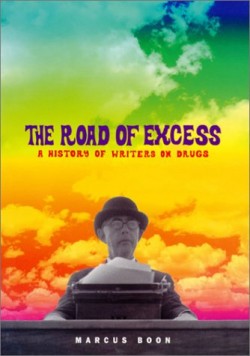Harvard University Press, 2002.
The Road of Excess began as my doctoral dissertation in the Comparative Literature department at New York University. I had been working with community based AIDS research groups, helping to write protocols for studies of promising anti-HIV drugs and I had the idea of applying the idea of a “literature review”, used in medical studies to show the history of research on a drug, to psychoactive or recreational drugs and the writers who’d used them. I was interested in seeing if literary accounts of drug use gave a consistent account of the effects of drugs like marijuana or opium over time — or if the meaning of a particular chemical substance was also “socially constructed” and changed over time, with users’ experiences reflecting the historical situation in which these experiences occurred.
From the Publisher:
“From the antiquity of Homer to yesterday’s Naked Lunch, writers have found inspiration, and readers have lost themselves, in a world of the imagination tinged and oftentimes transformed by drugs. The age-old association of literature and drugs receives its first comprehensive treatment in this far-reaching work. Drawing on history, science, biography, literary analysis, and ethnography, Marcus Boon shows that the concept of drugs is fundamentally interdisciplinary, and reveals how different sets of connections between disciplines configure each drug’s unique history.
In chapters on opiates, anesthetics, cannabis, stimulants, and psychedelics, Boon traces the history of the relationship between writers and specific drugs, and between these drugs and literary and philosophical traditions. With reference to the usual suspects from De Quincey to Freud to Irvine Welsh and with revelations about others such as Milton, Voltaire, Thoreau, and Sartre, The Road of Excess provides a novel and persuasive characterization of the “effects” of each class of drug—linking narcotic addiction to Gnostic spirituality, stimulant use to writing machines, anesthesia to transcendental philosophy, and psychedelics to the problem of the imaginary itself. Creating a vast network of texts, personalities, and chemicals, the book reveals the ways in which minute shifts among these elements have resulted in “drugs” and “literature” as we conceive of them today.”
Select Praise for The Road of Excess
“Theory-afflicted but nonetheless lively …” — John Lancaster, The New Yorker
“Writers have been taking drugs as long as there have been drugs to be had, and—as we learn from Marcus Boon’s fascinating and meticulous The Road of Excess—the line is blurred, in fact invisible, between those writers who take drugs to inflame or exalt their demons and those who simply need, in Aldous Huxley’s phrase, ‘a chemical vacation from intolerable selfhood’…” — James Parker, Boston Globe
“…in an era when critics warn that the literary monograph may soon die of
its own non-elevating dust, one can only laud Professor Boon for his
infinite resourcefulness.” — Carlin Romano, The Chronicle of Higher Education
Reviews
- Carlin Romano, The Chronicle of Higher Education
- Ashley Crawford, The Age
- Nick Groom, The Independent
- Jeremy Townley, The Oxonian Review
- Gordon Phinn, Books in Canada
- George Gessert, Leonardo reviews
- Heidi Lypps, Journal of Cognitive Liberties
- Richard Walls, The Boston Phoenix
-
Adam Mars-Jones, The Observer
-
John Lanchester, The New Yorker
-
Erik Davis, Bookforum
-
Justus Nieland, Postmodern Culture
-
Brian Musgrove, Australian Review of Public Affairs
- James Parker, Boston Globe
- Richard Broderick, Fifth Column
-
Carlos Graieb, Veja Online
-
Steven Rosen, The Denver Post
-
Lynn Crosbie, The Globe and Mail
-
Simon Ings, The New Scientist
-
Rebecca Shannonhouse, The Boston Globe
-
Nick Kre, The Toronto Star
Interviews
- Christian Bök, YorkU Magazine
